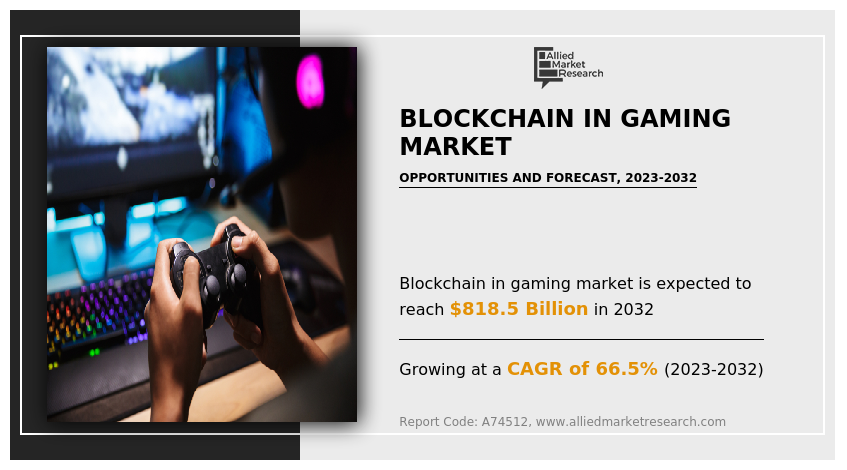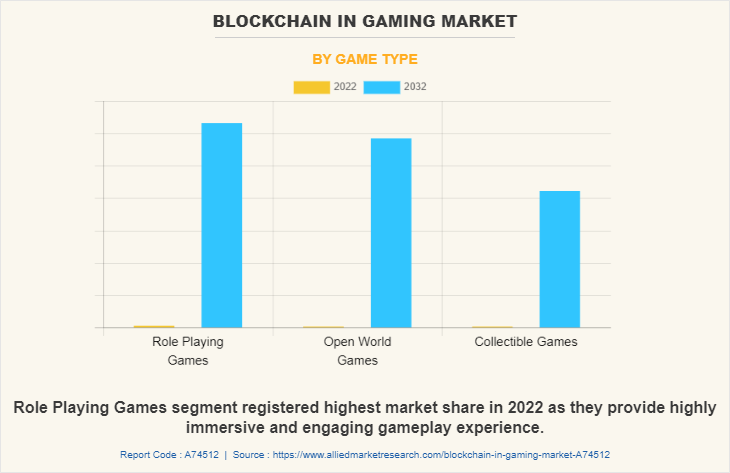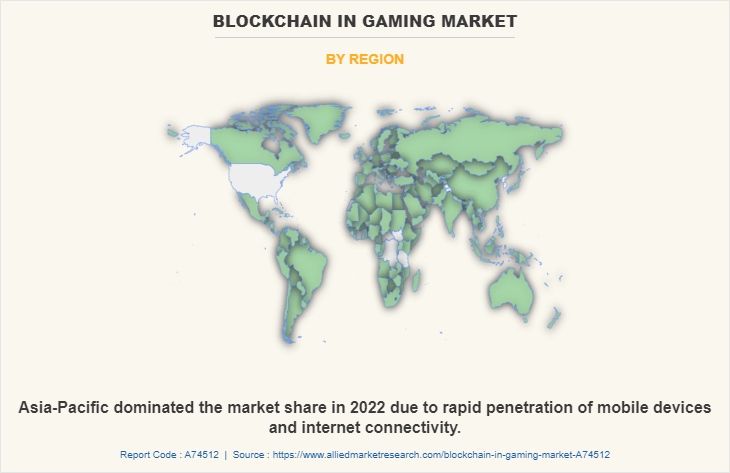Blockchain in Gaming Market Overview
The global blockchain in gaming market size was valued at USD 4.9 billion in 2022 and is projected to reach USD 818.5 billion by 2032, growing at a CAGR of 66.5% from 2023 to 2032.
Increasing demand for decentralized games and assets is a key driver for the growth of blockchain in gaming market. Decentralized games and assets enable players to have full ownership and control of their in-game assets. This means that players can transfer, trade, and even sell their assets without any restrictions or intermediaries, which is not possible in traditional centralized games. In addition, technological advancements in the smartphone technology and the rising interest in blockchain gaming are major driving factors for the market.
Key Market Insights
- By game type, the collectible games segment is the fastest-growing segment in blockchain during forecast.
- By platform, polygon segment is predicted to be the fastest growing segment during the forecast period.
- By region, Asia-Pacific is expected to register highest growth rate during the forecast period.
Market Size & Forecast
- 2032 Projected Market Size: USD 818.5 Billion
- 2022 Market Size: USD 4.9 Billion
- Compound Annual Growth Rate (CAGR) (2023-2032): 66.5%

How to Describe Blockchain in Gaming
Blockchain in gaming refers to the use of blockchain technology to create decentralized and secure gaming experiences. Blockchain is a decentralized digital ledger that can record transactions and data in a transparent, immutable, and secure way. Blockchain's decentralized and secure nature provide players with secure and transparent transactions. Blockchain can enable players to buy and sell in-game items, currencies, and assets in a secure and transparent manner, without the need for intermediaries. In addition, blockchain can provide a transparent and secure environment for gaming transactions. By recording all transactions on a decentralized ledger, blockchain makes it impossible for anyone to tamper with the game data or cheat.
However, the implementation of blockchain technology requires technical expertise and resources which are major factors hampering the growth of the market as blockchain is a complex technology that requires a thorough understanding of cryptography, distributed systems, and programming languages such as Solidity and Java. Thus, to implement blockchain technology, an organization needs to have a team of skilled developers who can design, develop, and deploy blockchain-based applications. On the contrary, increasing demand for virtual assets is likely to continue in the coming years. By leveraging blockchain technology to create secure and transparent marketplaces for virtual assets, game developers can create new revenue streams and enhance the gaming experience for players, which will provide an opportunity to scale up blockchain in gaming market in the forecast period.
Blockchain in Gaming Market Segment Review
The blockchain in gaming market is segmented on the basis of game type, platform, and device type. Based on game type, the market is segmented into role playing games, open world games, and collectible games. As per platform, it is segmented into ETH, BNB chain, polygon, and others. On the basis of device type, it is segmented into android, web, and iOS. Region wise, it is analysed across North America, Europe, Asia-Pacific, and LAMEA.

Based on game type, the role playing games segment attained the highest growth in blockchain in gaming market share in 2022. Due to the rise of blockchain technology, developers are creating cross-platform games that can be played on multiple devices and platforms. This allows players to engage with the game on their preferred device and also expands the player base for developers. Moreover, play-to-earn is a new business model that is emerging in the role-playing games segment of the market. This model allows players to earn cryptocurrency or other digital assets by playing the game and completing certain tasks or achievements.
However, the collectible games segment is attributed to be the fastest-growing segment in blockchain in gaming market forecast. This is because players are demanding more immersive game worlds that feel like real, living environments. This includes more realistic graphics, more interactive environments, and more dynamic non-player characters (NPCs). In addition, multiplayer gaming has become increasingly popular in recent years, and the trend is continuing with collectible games.

On the basis of region, Asia-Pacific attained the highest growth in 2022 and is expected to register highest growth rate during the forecast period. This is primarily because NFTs are becoming increasingly popular for trading in-game assets such as weapons, skins, and avatars. The Asia-Pacific region is a major player in the NFT market, with China being the largest market for NFTs in the world. The trend is expected to continue, with more gamers and developers exploring the potential of NFTs in gaming. In addition, decentralized finance (DeFi) is a rapidly growing sector in the blockchain industry, offering a range of financial services that are built on blockchain technology. In the gaming industry, DeFi is being used to enable gamers to earn cryptocurrency by playing games, lending, and borrowing virtual assets, and trading in-game items.
What are the Top Impacting Factors in Market
Market Driver
The rising interest in blockchain gaming
There has been a growing interest in blockchain gaming in recent years, with more and more developers and players exploring the potential of combining blockchain technology with gaming. Blockchain technology enables new revenue models for game developers, such as play-to-earn mechanics and the creation of unique, valuable in-game assets that can be bought, sold, and traded on blockchain marketplaces. In addition, blockchain technology enables players to own and control their in-game assets, giving them greater control over their gaming experience and increasing their engagement and investment in the game. The transparency and security features of blockchain technology can help reduce the risk of fraud, cheating, and hacking in the gaming industry.
Furthermore, the rising interest in blockchain gaming is driven by a combination of factors that are expected to continue to drive the adoption of blockchain technology in gaming industry in the coming years. As more developers and players explore the potential of combining blockchain technology with gaming, new and innovative blockchain games and experiences are likely to emerge, leading to a more diverse and vibrant gaming ecosystem.
Increasing demand for decentralized games and assets
Decentralized games and assets enable players to have full ownership and control of their in-game assets. This means that players can transfer, trade, and even sell their assets without any restrictions or intermediaries, which is not possible in traditional centralized games. Decentralized games and assets are more secure, as they are stored on a blockchain network that is highly resistant to hacking and fraud. This helps to prevent asset theft and fraud, which are common problems in centralized games and platforms.
In addition, decentralized games and assets are transparent, as all transactions are recorded on a public blockchain network. This helps to increase trust among players, as they can see exactly where their assets are and how they are being used. Therefore, these driving factors are contributing to the growing demand for decentralized games and assets in the gaming industry, and are driving the adoption of blockchain technology in gaming.
Technological advancements in the smartphone technology
Technological advancements in smartphone technology have been a driving factor in the growth of the blockchain in gaming market. The widespread adoption of smartphones has led to an increase in the number of mobile gamers, and this has created a demand for more advanced and secure gaming platforms. In addition, blockchain technology provides a decentralized and transparent system that allows gamers to have more control over their in-game assets, as well as ensuring the integrity of the game by preventing cheating and hacking. This has led to the development of blockchain-based gaming platforms that allow gamers to trade in-game items, earn rewards, and participate in gaming tournaments using cryptocurrencies.
Furthermore, smartphones have also played a significant role in the growth of the blockchain in gaming market by providing a platform for gamers to access these blockchain-based games. With the increasing processing power and memory capacity of smartphones, developers are now able to create more sophisticated blockchain-based games that can run on mobile devices. Moreover, the rollout of 5G technology has enabled faster download and upload speeds, reduced latency, and improved overall connectivity. This has paved the way for new applications and services, such as streaming high-definition video games, cloud gaming, and augmented and virtual reality. Therefore, these advancements are contributing to the growth of the market.
Restraint
The implementation of blockchain technology requires technical expertise and resources
Blockchain is a complex technology that requires a thorough understanding of cryptography, distributed systems, and programming languages such as Solidity and Java. Thus, to implement blockchain technology, an organization needs to have a team of skilled developers who can design, develop, and deploy blockchain-based applications. These developers need to have experience in blockchain technology, distributed systems, and smart contract development. In addition, implementing blockchain technology also requires resources such as hardware infrastructure, software tools, and platforms for deploying and managing blockchain-based applications. Organizations need to invest in these resources to ensure that they have a secure and efficient blockchain infrastructure.
Furthermore, implementing blockchain technology also requires compliance with various regulations, depending on the industry and jurisdiction. Organizations need to have a good understanding of the legal and regulatory frameworks that apply to blockchain technology in their industry. Therefore, implementing blockchain technology requires technical expertise and resources, which can make it challenging for organizations without a strong technical background or the necessary resources to undertake such a project.
Lack of regulatory clarity
The lack of regulatory clarity is one of the key restraints for the adoption of blockchain technology in the gaming industry. Blockchain technology is still a relatively new and rapidly evolving area, and regulatory frameworks have not kept pace with its development. This creates uncertainty for game developers and players, as they may not know how existing regulations apply to blockchain-based games or what new regulations may be introduced in the future. In addition, many blockchain-based games use cryptocurrencies or other digital assets as a means of exchange, and there is currently a lack of clarity around how these assets should be regulated.
Moreover, some governments have taken steps to regulate cryptocurrencies, while others have banned or restricted their use altogether. Furthermore, it creates uncertainty for game developers and players, and can make it difficult to navigate the legal and regulatory landscape. As blockchain technology continues to evolve and mature, it is likely that regulatory frameworks will also evolve to address these issues.
Opportunity
Increasing demand for virtual assets
The gaming market is rapidly growing, and there is an increasing demand for virtual assets such as in-game items, skins, and other digital goods. Blockchain technology can provide a secure and transparent environment for the creation and trade of these assets, creating new opportunities for game developers and players. Moreover, game developers can create new revenue streams by monetizing virtual assets through blockchain-based marketplaces. Players can buy, sell, and trade virtual assets securely and transparently, creating new opportunities for game developers to generate revenue.
In addition, blockchain technology allows for decentralized ownership and control of virtual assets, giving players more control over their in-game items and creating new opportunities for player-owned marketplaces. The use of blockchain technology to create valuable and tradable virtual assets can increase player engagement and retention by creating a more personalized and immersive gaming experience. Furthermore, the increasing demand for virtual assets in the gaming market has the potential to create many future opportunities for game developers and players. By leveraging blockchain technology to create secure and transparent marketplaces for virtual assets, game developers can create new revenue streams and enhance the gaming experience for players.
Which are the Leading Companies in Blockchain in Gaming
The following are the leading companies in the market.
Webllisto
IBM
LeewayHertz
Unicsoft
Animoca Brands Corporation Limited
Sara Technologies Inc.
Cubix
Appinventiv
Maticz Technologies Private Limited
Lumighost Ltd.
Market Landscape and Trends:
The blockchain in gaming market growth has witnessed significant inclination in recent years, driven by a number of factors including growing interest in player-driven economies, blockchain-based gaming marketplaces, and the integration of DeFi (decentralized finance). Blockchain technology enables players to create their own economies within games, allowing them to trade in-game assets and earn real-world value. This has the potential to create a new gaming ecosystem where players can earn a living by playing games.
Moreover, NFTs are becoming an integral part of blockchain gaming. Gaming companies are using NFTs to represent unique in-game assets, such as characters, weapons, and other collectibles. In addition, cross-chain interoperability is becoming more important in the blockchain gaming market. This allows assets to be transferred between different blockchains, enabling players to use their assets across multiple games or platforms. Therefore, the market is constantly evolving, with new trends emerging as the technology advances.
What are the Key Benefits for Stakeholders:
This report provides a quantitative analysis of the market segments, current trends, estimations, and dynamics of the blockchain in gaming market analysis from 2021 to 2031 to identify the prevailing blockchain in gaming market opportunities.
The blockchain in gaming market research is offered along with information related to key drivers, restraints, and opportunities.
Porter's five forces analysis highlights the potency of buyers and suppliers to enable stakeholders make profit-oriented business decisions and strengthen their supplier-buyer network.
In-depth analysis of the blockchain in gaming market segmentation assists to determine the prevailing market opportunities.
Major countries in each region are mapped according to their revenue contribution to the global market.
Market player positioning facilitates benchmarking and provides a clear understanding of the present position of the market players.
The report includes the analysis of the regional as well as global blockchain in gaming market trends, key players, market segments, application areas, and market growth strategies.
Blockchain in Gaming Market Report Highlights
| Aspects | Details |
| Market Size By 2032 | USD 818.5 billion |
| Growth Rate | CAGR of 66.5% |
| Forecast period | 2022 - 2032 |
| Report Pages | 290 |
| By Game Type |
|
| By Platform |
|
| By Device Type |
|
| By Region |
|
| Key Market Players | Maticz Technologies Private Limited, Lumighost Ltd., IBM, Webllisto, Unicsoft, LeewayHertz, Sara Technologies Inc., Animoca Brands Corporation Limited, Cubix, Appinventiv |
Analyst Review
The blockchain in gaming market has experienced significant growth in recent years, and the trend is expected to continue. New blockchain-based gaming platforms are emerging, offering players a decentralized and transparent gaming experience. These platforms are attracting both developers and players, driving the growth of the blockchain in gaming market. Moreover, traditional game developers are increasingly looking to integrate blockchain technology into their games to enhance gameplay and provide new opportunities for players. In addition, blockchain technology enables players to truly own and control their in-game assets. This is a significant improvement over traditional gaming, where players do not have full ownership of their in-game assets. Blockchain-based ownership and control provide players with new opportunities to monetize their gaming efforts and invest in virtual assets. Furthermore, blockchain technology enables interoperability between games, allowing players to transfer assets from one game to another. This can enhance the gaming experience and create new opportunities for players.
Furthermore, market players are adopting various strategies for enhancing their services in the market and improving customer satisfaction. For instance, In March 2023, Wemade Co., Ltd, has announced a strategic partnership with Space and Time (SxT), a leader in decentralized data warehousing. The partnership will allow Wemade to power its blockchain and gaming services with Space and Time’s decentralized suite of developer tools. WEMIX has also announced plans to launch an Ethereum layer-2 utilizing zero knowledge proof (ZKP) protocols that will improve scalability while still ensuring users’ privacy and security. Space and Time and Wemade are planning to closely collaborate in the future with next-generation decentralized infrastructure for more robust and scalable GameFi development. Moreover, in March 2023, Fenix Games and Horizon Blockchain Games, a web3 gaming and infrastructure company, announced a partnership to help usher in a new wave of top-tier game developers to build best-in-class blockchain games. Horizon's Sequence product is a leading web3 developer platform: its modular web3 developer stack and smart wallet provide the tools that will unlock the scalability and use of the blockchain for the masses. Fenix and Horizon are revolutionizing the gaming industry through their innovative and turn-key technology solutions, allowing for greater transparency, security, and player ownership.
Some of the key players profiled in the report include Animoca Brands Corporation Limited, Appinventiv, Cubix, IBM, LeewayHertz, Lumighost Ltd, Maticz Technologies Private Limited, Sara Technologies Inc., Unicsoft and Webllisto. These players have adopted various strategies to increase their market penetration and strengthen their position in the blockchain in gaming market.
The global blockchain in gaming market was valued at USD 4,926.81 million in 2022, and is projected to reach USD 818,464.51 million by 2032
The blockchain in gaming market is projected to grow at a compound annual growth rate of 66.5% from 2023 to 2032.
The key players operating in the blockchain in gaming market are Animoca Brands Corporation Limited, Appinventiv, Cubix, IBM, LeewayHertz, Lumighost Ltd., Maticz Technologies Private Limited, Sara Technologies Inc., Unicsoft, and Webllisto.
Asia-Pacific is the largest regional market for Blockchain in Gaming Market.
Blockchain technology provides a secure environment for gaming transactions which drives the growth of blockchain in gaming market.
Loading Table Of Content...
Loading Research Methodology...



